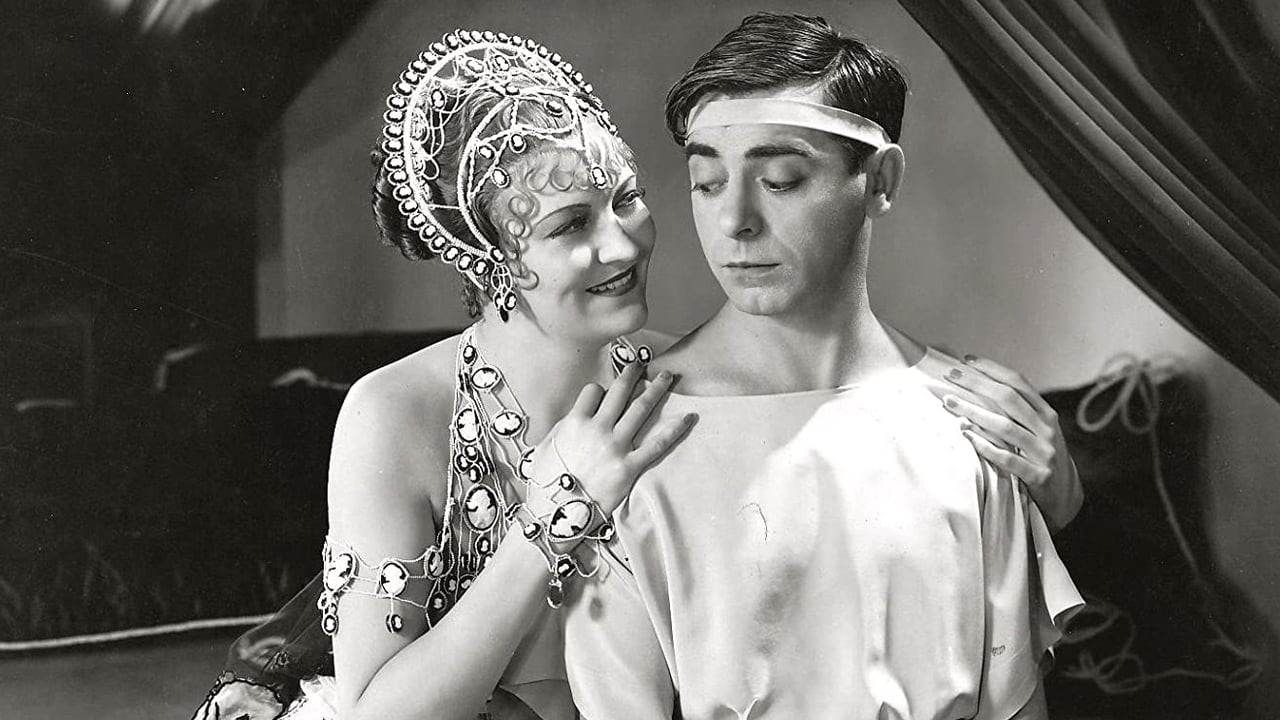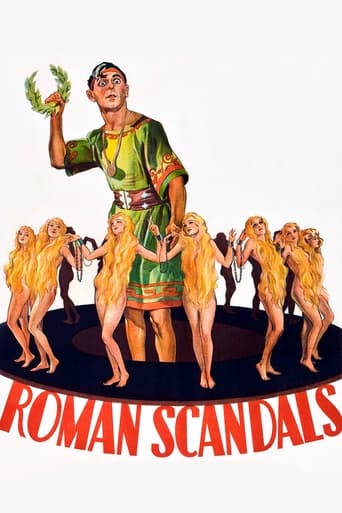


A kind-hearted young man is thrown out of his corrupt home town of West Rome, Oklahoma. He falls asleep and dreams that he is back in the days of olden Rome, where he gets mixed up with court intrigue and a murder plot against the Emperor.Based on how few people have rated this film (under 500), I am left with the impression that it must not be purchased, streamed or aired very often. And what a shame, because it is pretty funny, and would be enjoyed by anyone who likes the witty kind of humor the Marx Brothers were doing. (There is even a poison sequence that is not unlike a Danny Kaye skit twenty years later: "The pellet with the poison's in the vessel with the pestle; the chalice from the palace has the brew that is true!") I suppose the blackface skit may be one reason the film has fallen out of favor, but this is unfortunate. Whether you consider this racist or not, it is part of film history and should not be simply forgotten or hidden.
... View MoreThis was my first look at Eddie Cantor, whom I subsequently saw in a few other films. I thought he was funny, a very entertaining entertainer - a guy who could sing well and tell jokes and perform slapstick comedy. With all that, he reminded me a bit of the Marx Brothers. He could fit in with those guys, particularly Groucho with his comparable wit and short stature.Even though "Roman Scandals" was only 92 minutes, it would have been even better cut about 10, although I'm not complaining. In between the gags and the sappy Roman days story were at least three songs by Canotr, who was a decent singer and whose songs were pretty good, along with two Busby Berkely numbers with a bunch of scantily-clad ladies. It's corny stuff but it's still good. Lucille Ball is supposed to be in here but I didn't spot her in the two times I've watched this movie. I hardly recognized Gloria Stuart, too.The last part of the movie was similar to the climax of many a silent film comedy with a great chase scene. Cantor, a la Ben-Hur, raced his chariot with four white horses. Instead of an arena, however, Cantor raced through the countryside. There were great stunts and funny bits in that race.It was a great finish to a dated-but-very entertaining film. I wonder why Cantor's films are not available on DVD? I hope that oversight is corrected soon.
... View MoreWhat needs to be understood about this entertainment film is that it is a revue. The 'hook" for its use of the time-travel gimmick, forward or in this case backward, which it helped to inspire for years to come is a parallel drawn by the authors between a corrupt West Rome, Oklahoma and the governors of ancient Rome's empire. The bridge between the two is opened in the mind of Eddie, played with verve and charisma by Eddie Cantor. In this the most lavish of his four 1930s musicals, with choreography by Busby Berkeley, Cantor imagines himself back in ancient Rome, where he uncovers corruption similar to his own small town's problems. In this musical comedy enlivened by Berkeley, with story and gags by George S. Kaufman, Nat Perrin and and Robert Emmet Sherwood among others, Eddie first finds bribery going on by a developer who wants to build a new jail, dispossessing many residents in the midst of the great Depression. As a result of his protests, after singing a song, Eddie is thrown out of town by police. He then finds himself inexplicably in ancient Rome, and after insulting the Empress, he is condemned to be sold as a slave. Narrowly escaping the clutches of an amorous hag, he is bought by Josephus, handsome David Manners, who wants him as a friend, not a slave. Meanwhile, the Emperor Valerius's favorite, played by Ruth Etting, is being sold away. This leads to the magnificent "No More Love" number involving naked girls covered only by long tresses chained to huge pillars and a Berkeley dance number involving a symbolic slave-girl dancer who plunges from the top of a huge staircase at the end of the number. Meanwhile, the story continues. The four strands involved are Josephus's love for a Princess (Gloria Stuart), Eddie falling afoul of Roman mores, the Empress Agrippina, Verree Teasdale, trying to poison her philandering husband, played with award-level gusto by Edward Arnold, and Valerius pursuing Sylvia (Stuart). Josephus has renamed Eddie "Oedipus"; an hilarious sequence involves "lava gas" being administered to Eddie, then to the royal torturers and finally the Emperor. The Emperor wants Olga back, but still has time to pursue Sylvia. Josephus tries to free both Eddie and Sylvia when the Emperor takes them but is rebuffed. Sylvia agrees to be taken to the palace--to remain there until she falls in love with Valerius-- if he will leave her people unpunished. Then the imperial food taster dies--Agrippina's work, of course; and Eddie gets the job. By this time he has introduced several U.S. vices including crooked dice into ancient Rome. Agrippina summons Eddie to her couch and tells him she wants to poison Valerius. As a precaution, Valerius banishes his rival Josephus who decides to wait for Sylvia, to be spirited away to him, in his chariot. After some tribulations with the palace's majordomo, Alan Mowbray, Eddie gets the message he's been given to Sylvia. After another song in the women's quarters, Eddie finds out about corruption involving Valerius and two senators--a parallel to the West Rome chicanery. Agrippina then warns Eddie not to eat the night's dinner, which he feeds to the royal crocodile. The Empress puts the blame for the animal's demise onto Josephus and Sylvia; Josephus takes Sylvia away in his chariot, and after being condemned to be thrown to the lions himself, Eddie escapes and tries to catch them, to prevent Josephus's being killed at the port of Ostia. After a memorably and funny chariot chase, Cantor wakes up in the U.S. again; and there is a bribe to the police chief as evidence of the wrongdoing he had claimed in his pocket. The satire ends happily, but not without having raised disturbing parallels between republicans' poisoning of the federal reserve and US corruption and the statism of Rome's authoritarian emperors. The piece is a satire from beginning to end, with elements of comedy, drama, parody and song. it is a difficult sort of film to do well, I assert; and to expect this to be any one sort of offering is to fail to comprehend its purpose. This is a thinking-man's light-entertainment, nothing more and a great deal more than less. Girls in revealing costumes, an escapist look at Roman parallels, some delightful actors, a few songs and several spectacular sequences; this was entertainment in the 1930s and for those willing to enjoy it on its own terms, as pure fun, it still is. Every time-travel comedy made since "A Connecticut Yankee" of 1931 and this film owes a great deal to the inspiration of both, but especially I suggest to "Roman Scandals". Frank Tuttle directed this fast-paced and sumptuous romp. The cinematography was by Ray June and Gregg Toland, with costumes by John W. Harkrider, and difficult art direction was provided by Richard Day. Alfred Newman did the music, Harry Warren the original songs. In the cast, Arnold and Teasdale are wonderful, the young leads are attractive throughout and Alan Mowbray delightful in a comedic turns. There are several important actors in small parts including Jane Darwell, Lucille Ball and Billy Barty. With an updated score, I suggest this seminal musical could be successfully remade; but the hard part would be to remove the Eddie Cantor contribution, which was as much a pattern for future comedic talents such as Lou Costello and Jerry Lewis as it was intrinsic to the fun of the production. This Samuel Goldwyn opus may be a trifle pretentious here and there, but not one moment of it I suggest is ever dull.
... View MoreThis 1933 Samuel Goldwyn production is generally regarded as being Cantor's most successful thirties film. A fascinating depression-flavoured movie, it is a bit reminiscent of THE WIZARD OF OZ in that there are "reality book-ends" the majority of the film being a dreamer's fantasy. Rather than having a Technicolored centre, however, this film benefits from Gregg Toland's famous silvery hued cinematography. The rarely seen in films Ruth Etting had her only movie role of any merit as Olga: fortunately her character's dialogue is kept to a minimum for it's rather poorly delivered. As Emperor Valerius, Edward Arnold does fine in a surprisingly modern-styled comedy performance, and the usually wooden and boring David Manners delivers an refreshingly against-type performance as the sprighty Josephus. As Princess Sylvia, a luminously youthful Gloria Stuart is lovely. The film premiere at Graumann's Chinese Theatre and was broadcasted via radio & the film made a million dollar profit. Contrary to popular belief, this wasn't Lucille Ball's film debut: she had appeared in both BROADWAY THRU A KEYHOLE & BLOOD MONEY in bits priorly. However, the lovely young blonde girl in the film's beginning who enthusiastically informs the locals "Here comes Eddie!" is indeed a 22 year-old native of Jamestown, New York named Lucille Ball.
... View More